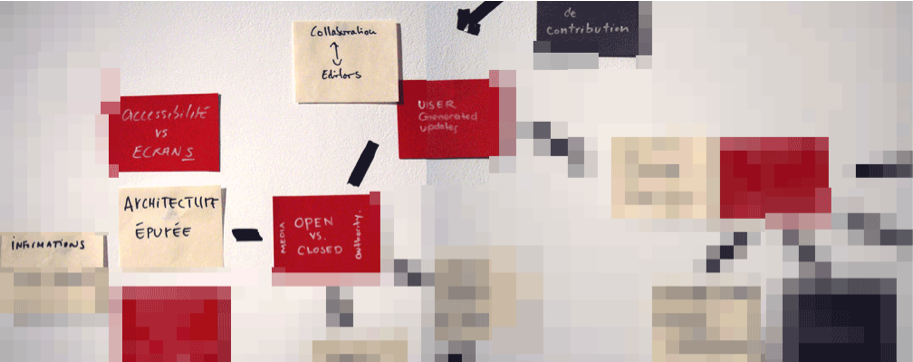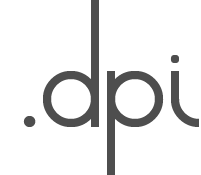
Photo retouchée d'une session de visualisation dans le cadre du processus de refonte de la revue .dpi, janvier 2013.
Dear Friends,
As of Spring 2013, .dpi will be taking a new shape. Restructuring and solidifying its mandate, it will be published twice a year, while building a participatory platform -- through a regularly updated blog -- that is more community-based, flexible, spontaneous, and critical.
Moreover, building on its short history, .dpi is now proudly defined as a “feminist journal of art and digital culture.”
The publication is propelled by a new editorial committee composed of Julie Alary Lavallée, Amber Berson, Esther Bourdages, Christina Haralanova, Corina MacDonald, Katja Melzer, Candace Mooers and Deanna Radford. That’s right, these gals now make up one of the most multi-talented and critically engaged groups in the independent arts in Montreal and, perhaps even, the world.
In an effort to increase the independence of the publication from its founders at Studio XX, the feminist artist-run centre invited me to serve as permanent editor-in-chief. Together, we sat down to visualize our individual and collective interests (by literally bringing real objects and concrete examples to the table). We dreamed of projects that would allow us to stick together amidst a socio-political context that makes our lives increasingly precarious, and where critique and creativity are constrained in favour of what will sell better or maintain the status quo.
Indeed, why redefine the publication as a “feminist journal of art and digital culture” now? It is not a given that such a project is an urgent one. However it is our task to define that urgency and no one else’s. To embrace the potentialities of .dpi together has been an exciting and fun process, opening our imagination to new hopes, ideas and actions.
In our discussions, the question of “place” traversed our various concerns. In 2013, we no longer oppose “local” and “global” but we can certainly see that it is necessary to create and strengthen real community. Instead, atomized, individualistic and normative configurations of acting and thinking continually persist. In 2013, the focus should perhaps be put on self-assertion rather than simply self-representation,[i] that is, to gain a sense of being from somewhere, of being anchored. To be able to share our personal experiences and to expand our collective struggles, across different fields and terrains. And to be able to do that within a welcoming and supportive environment, one where we feel comfortable enough to take risks, experiment, and make mistakes.
Do we have culture?[ii] Of course, there is a lot of “culture” (some might think maybe too much) but the question is, which kind...? I believe that most of us are too polite,[iii] even for those of us who focus on the ‘political’ or the ‘critical’. It is as if most cultural production and critique maintain themselves in a vacuum of liberal and bourgeois consensus. The world and social relations are messed up. And if we decide to ignore that, then we must have something to hide or something to gain... If together we support each other in learning to talk about real things and act accordingly, culture and community will be created again.
Besides, culture is not something that inherently belongs to artists or writers or some ‘elite’. Culture is born out of curiosity and passion, which any of us has the ability to demonstrate and nurture. It is time for culture to no longer remain a commodity (or some newspaper section) but to become relevant, bolder and ‘dirtier’, something that is co-reproduced out of antagonisms, and where the end is self-determination (i.e. within a framework of anti-oppression). In other words, to refuse a feminism that is imperialist, racist, or transphobic. Culture is indeed sustained through an ability to be critical (and creative), that is, to know when and where things are messed up, and to be able to say it, so that an actual discussion can take place. It is also about valuing what we already do well, individually and as part of collectives or independent arts organizations, to deem it important enough to talk about, and discuss as widely as possible. In so doing, we can learn, together, which is one of the reasons .dpi will be developing and updating a community glossary, as well as tools for collaboration, and organizing in-person events.
Each issue of .dpi will still be guest edited by a different person (or group) associated with a particular focus, but it will also present content that is unrelated to the theme so as to preserve a space for other timely topics for feminist artists and their allies. See our fresh new mandate here.
In this 27th issue, feminist scholar of free and open source software Christina Haralanova has guest edited a section on hacktivism, in close collaboration with the editorial team. As much as possible, in the short time available to us, we have tried to explore other mediums than that of the written word in order to fully experiment with the online nature of the publication and its artistic edge. While some texts are still quite academic, we have the hopes of gradually making our place by proposing a fresh new hybrid style that is that of .dpi!
Be in touch,
Sophie Le-Phat Ho
in collaboration with the .dpi Editorial Committee
Notes
[i] I’m borrowing this motto (inspired by Tiqqun) from my involvement in another collective, Artivistic. Props.
[ii] Obviously, culture can mean a lot of things in the world, generally. Here culture is perhaps more specifically meant as that which makes and drives community. But I’m also playing with the fact that today “culture” is also an overused expression that might have lost any meaning altogether...
[iii] Coincidentally, as the editorial was being written, a friend shared this thought-provoking quote by Susan Sontag on Simone Weil, which was recirculated via loneberry’s Tumblr: “The culture-heroes of our liberal bourgeois civilization are anti-liberal and anti-bourgeois; they are writers who are repetitive, obsessive, and impolite, who impress by force—not simply by their tone of personal authority and by their intellectual ardor, but by the sense of acute personal and intellectual extremity. The bigots, the hysterics, the destroyers of the self—these are the writers who bear witness to the fearful polite time in which we live. It is mostly a matter of tone: it is hardly possible to give credence to ideas uttered in the impersonal tones of sanity. There are certain eras which are too complex, too deafened by contradictory historical and intellectual experiences, to hear the voice of sanity. Sanity becomes compromise, evasion, a lie. Ours is an age which consciously pursues health, and yet only believes in the reality of sickness. The truths we respect are those born of affliction. We measure truth in terms of the cost to the writer in suffering—rather than by the standard of an objective truth to which a writer’s words correspond. Each of our truths must have a martyr.”
